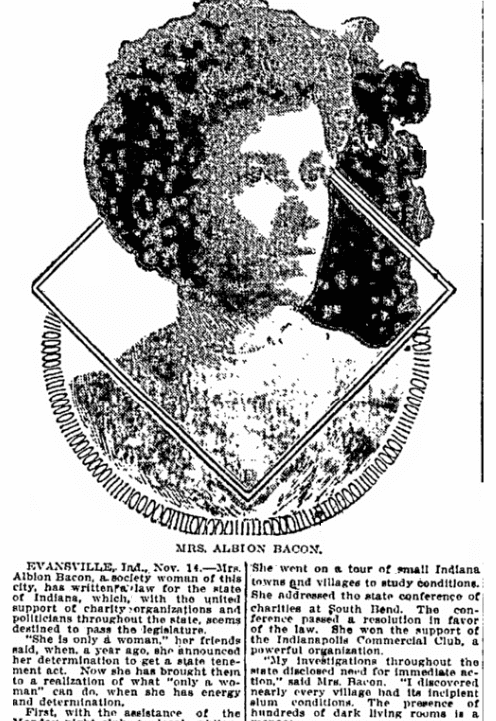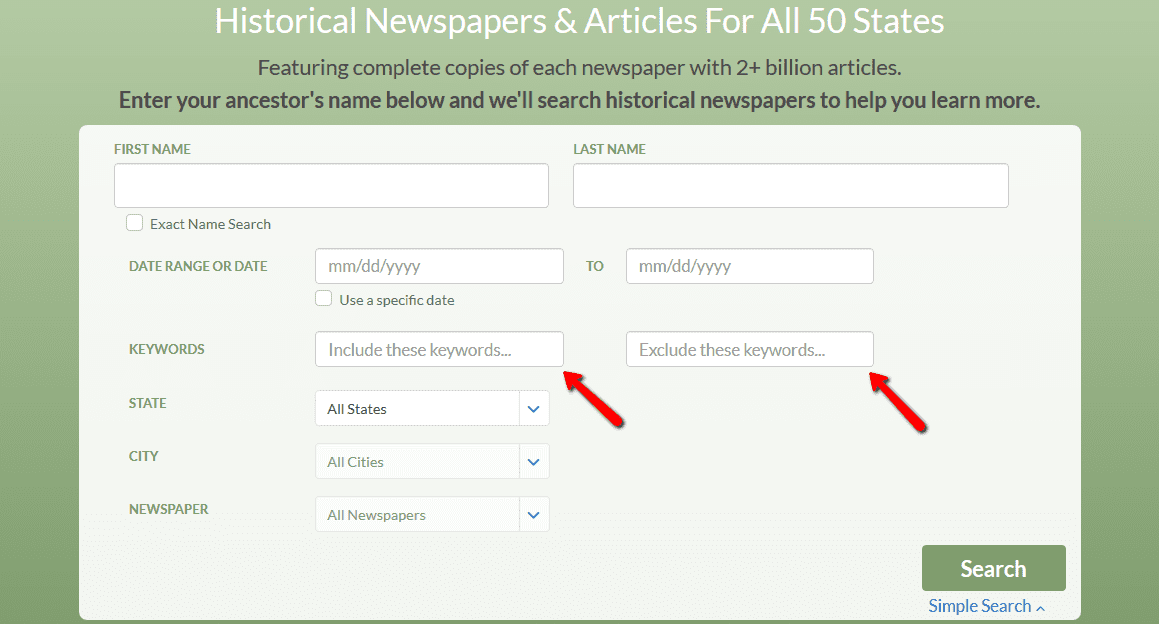Introduction: In this article, Gena Philibert-Ortega provides search tips for finding an ancestor whose surname is a common noun or verb. Gena is a genealogist and author of the book “From the Family Kitchen.”
One of the frustrations that family historians feel is researching a family surname that is also a noun or a verb. When I present to audiences, this problem is one of the questions I frequently get when I explain the genealogical treasures that can be found in newspapers. The frustration of researching a surname that is also a word for a place, thing, or action can make finding any relevant newspaper article mention of an ancestor seem nearly impossible.

I understand this frustration. One of my ancestral surnames, Chatham, is also the name of various counties in the Southern states where the family resided as well as businesses, schools, and streets. If I try to just search on the name “Chatham” in an effort to broaden my possible results and find additional family members, the task appears almost impossible with over 1.8 million results currently in GenealogyBank’s Historical Newspaper Archives.
The researcher’s frustration in trying to separate relevant newspaper articles from those that are not relevant came to the forefront for me recently as I searched for recipes using bacon – which is also a surname. I had to use different search techniques in order to get results for bacon the smoked meat and not people with the Bacon surname.
And the reverse is just as big a problem. Imagine if Albion Bacon, shown below, was your ancestor, and you did a search on Bacon hoping to learn more about her family – and you ran into thousands of recipes using bacon the smoked meat.

So, if this is something you face in your research, what can you do? Here are a few suggestions for your next search for that ancestor with a common surname.
Include/Exclude Words
One of my favorite tools in the GenealogyBank Advanced Search engine is the ability to Include and Exclude keywords.

This is especially useful when searching a surname that is also a verb or noun. What better way to narrow your search than by excluding words associated with what you don’t want to find (in the case of Bacon: food, cooking, recipe). You can also consider including words like family, Mr., or even the words died or survived if looking for an obituary. Is there a chance you could exclude a word that does appear in an article about your ancestor? Yes, but using the Include/Exclude feature is a useful search technique and is just one of many ways you should search.
Phrase Searching
An exact phrase search is done when you add quotation marks to two or more words that you enter into the search box. This is a great tool to use when looking for a specific ancestor. However, it’s important to remember that if the ancestor’s name was misspelled or slightly different than what you have entered (for example an initial was used, or the last name is shown before the first name) this technique will not work.
To use an exact phrase search, simply put quotation marks around your ancestor’s name, such as “John Bacon.” Because his name might be listed using numerous variations, including Bacon, John; Jno Bacon; or J. Bacon, make sure to try multiple searches using phrase searching with each variation.
Boolean Operators
Boolean operators might be just what you need to limit your search, and they can be combined with wildcards and proximity operators on GenealogyBank. For more information about the various ways to search on GenealogyBank, see the Advanced Techniques web page: https://www.genealogybank.com/information/help/advanced-techniques.
You can use the Boolean Operators AND, OR, NOT when searching on GenealogyBank. For the purposes of trying to limit a search, consider using NOT which tells the search engine that the word following NOT cannot be present in the results. So, with the surname Bacon, we may want to list Bacon NOT Sandwich or Bacon NOT Recipe. Using the term AND between two words tells the search engine that both words must appear in a relevant search result. This can assist you to narrow your search to a specific name or even a phrase like Bacon AND Family.
Keep Searching
Research is an ongoing process and when you are researching a tricky ancestral surname it can mean multiple searches. Don’t forget that there are other ways to narrow a search on GenealogyBank including choosing to narrow your results to a state or even a specific newspaper.
To learn more about using the GenealogyBank search engine, see the Frequently Asked Questions page at https://www.genealogybank.com/information/help.
Genealogy Tip: Don’t forget to use the feature Save My Search on GenealogyBank to save the searches you do. This can help you keep track of what terms you have searched and what you haven’t.

Thank you for this article. My family’s surname is “Hanger.”
That would definitely be another surname that would be difficult. I hope the article’s tips provide you some ideas for your search. Good luck in your research!
If you are looking for someone with the last name of Bishop, what would be the best way to eliminate the Catholic Bishop from your searches?
Roberta,
On GenealogyBank you might want to use the Exclude box and exclude words like Catholic and/or Church. The only problem is that if you exclude the word “church” you may accidentally exclude relevant newspaper articles such as a wedding notice or obituary so make sure to try excluding “Catholic” first and see how that works. You could also use the Include box and add the word “family,” “Mr” or “Mrs” and other words that you would expect to see in the articles you are searching for.
Good luck!–Gena
Trying to search my father’s side of the family, last name being “Smith,” is no easy task. I have barely begun and already hit a brick wall. My father’s side is from Jackson, TN, with prior location being Crockett Mills, TN.
I got as far as my great grandfather. So frustrated.
Suzie,
Smith is a difficult name to research. Try to search by including the names of family members that might be found listed in an obituary or marriage notice. If someone in the family has a unique first name, try searching for them. Also, narrow your search by a date range and state. The key for your research is to be specific since trying to search broader will produce too many hits.
Good luck!
Gena
How do you search for a common name like “Collins “ when you don’t have a birth date ?
Donna, do you have a first name or a first name of anyone in the immediate family? Also, if you have a place they lived you could narrow the search by choosing that state.
If there’s someone in the family that might also be mentioned with the person (like in an obituary) you could add them in the field of terms in “include.” Good luck!
I have the surname March for several families. I have tried the quotation marks and name but I still get swamped with things regarding the month of March. I will try adding family or lived or died!
Bonnie, also try excluding the word “month.” See if that helps.
Also consider narrowing the search by the state they lived in.–Gena
I am searching Bacon, Bell and Jones… not a lot of fun. Bacon and Bell I have narrowed down to New England and Canada, but Jones is a real can of worms. They started in Ireland, went to England and then came to America… New York to be specific. Many frustrating days ahead of me but it will be worth it in the end.
Linda, I hear you! I have a Jones as well and it is plenty frustrating. It’s what makes family history research challenging. Good luck!
I am searching for the surname White! Parents of Jacob Harrison White, who was born in Ohio in 1843. He was a Civil War veteran, who died in a veteran’s home in South Dakota. I’ve been looking for many years!
Connie, make sure to try different variations of his name as well as using quote marks for an exact phrase search. So for example, “J. H. White” or “John H. White.”
It can definitely be trying to not only have such a common surname but also a common given name! Good luck with your research!–Gena
Thank you for these tips. I have common word surnames such as Amend, Sweet, Sharp, and Pickup to deal with. It can be trying to weed out the Amendments, sweet potatoes, sharp knives and pickup trucks and focus on the names without the help of the exclusions.
Clorinda, You definitely have quite a few difficult surnames. The ability to exclude is such a big help with those types of names. Also, using quote marks in your online searches so that you are searching for an exact phrase can also help. For example, “John Pickup.”
Good luck with your research!–Gena
Great article. I do have a question though. I have a surname in my family tree of Francisco that I’m trying to search for, but I keep getting results for San Francisco. My Francisco’s lived in Ohio. How can I search for them without getting a bunch of articles related to San Francisco?
Btw, when I try typing Francisco NOT San in the “last name” box, I’m getting results for Francisco and the word ‘not.’
Betty, You might want to type Francisco in the last name box and then in the Exclude box, type in “San Francisco.” Also, limit your search to just Ohio newspapers.–Gena